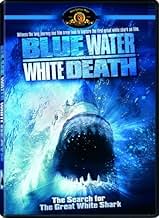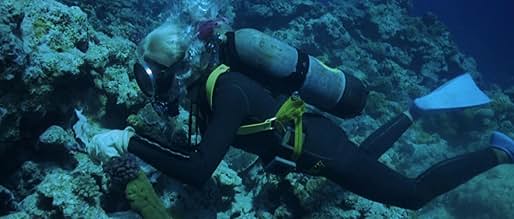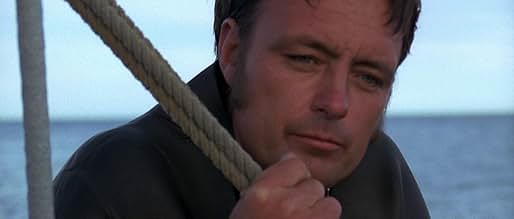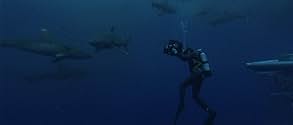CALIFICACIÓN DE IMDb
7.1/10
476
TU CALIFICACIÓN
Agrega una trama en tu idiomaDocumentary focusing on great white sharks.Documentary focusing on great white sharks.Documentary focusing on great white sharks.
Stuart Cody
- Self
- (as Stuart R. Cody)
Peter Lake
- Self
- (as Peter A. Lake)
Valerie Taylor
- Self
- (as Valerie May Taylor)
Stan Waterman
- Self
- (as Stanton A. Waterman)
- Dirección
- Guionista
- Todo el elenco y el equipo
- Producción, taquilla y más en IMDbPro
Opiniones destacadas
In 1969 Peter Gimbel set off on the First ever Expedition to Film The Great White Shark. His Team included other World famous underwater Photographers: Stan Waterman, Ron & Valerie Taylor, and also Shark Attack Survivor Rodney Fox.
Their search for the Great White lasted for 9 months and it took them from South Africa to South Australia. A lot of the footage that was Filmed had never been seen before. Some highlights like the dives with the feeding Oceanic Whitetips, and the final encounter with the Great White Shark are simply awesome.
This Documentary is an All Time Classic and is a Tribute To Both the Expedition Team and to the Sharks.
Their search for the Great White lasted for 9 months and it took them from South Africa to South Australia. A lot of the footage that was Filmed had never been seen before. Some highlights like the dives with the feeding Oceanic Whitetips, and the final encounter with the Great White Shark are simply awesome.
This Documentary is an All Time Classic and is a Tribute To Both the Expedition Team and to the Sharks.
10PrncssG
Although I was young when I saw this movie, it has stuck with me all through the years. This is the movie that spawned my interest in sharks! I praise the makers for such a wonderful idea, too bad it got lost in all the Jaws "wake".
An interesting film and seafaring adventure of an expedition tracking a great white shark through hundreds of miles of open sea spanning three continents. The search finally bears fruit some 83 minutes into the film which has a leisurely pace throughout and captures the feeding frenzy of white tips on whale carcasses, and barracudas also manage to get screen time for several minutes. Peter Gimbel and his crew are frustrated by their failure to spot a great white but finally get lucky at Dangerous Reef on the south coast of Australia. Here, Gimbel is finally rewarded with great footage of the huge fish. Shark cages are used to film the great white that seems more intent on the cage and the divers inside than the bait dangled before it. An Australian diver relates his run-in with a great white in the ocean, detailing his injuries and his miraculous escape. The footage of the underwater sequences throughout the movie is expertly done.
The wealthy Peter Gimble, model for Mr. Hooper of Jaws, hires a ship and a crew and staffs it with a truly mixed bag of professional underwater naturalists and photographers (and one folk singer) and sets off in pursuit of the great white shark. By the film's midpoint, cast and crew are in open mutiny. Peter Mathiessen, hired as voyage historian, thought the product of the trip would be the world's most expensive home movie but it is considerably more interesting, detailing in surprisingly vivid terms some real highs and lows for a trip that is part carnival, part nature study. Contrary to expectations, the most striking sequence involves not a great white shark but a group of sharks (primarily blues) feeding on a sperm whale carcass. By exiting the shark cages and photographing the feeding up close, the divers raised the bar considerably on this kind of filming. There are also memorable moments as when Stan Waterman and Valerie Taylor struggle through high seas to get back aboard the boat and Mr. Waterman promises the cameraman that if he ever films them struggling like that again without helping them, he will find himself in the water with them. The sequences involving the great white are not surprisingly very striking. I suspect there was a little after-action photography added to the sequence showing Peter Lake trying to cut the rope holding the great white to his cage. A minor point in a great film. There are also some great moments under the credits, my favorite being Stan Waterman describing how to drive off a shark with a SCUBA knife. A real treat if you ever get to see this.
Besides seeing Blue Water, White Death in a theater in 1971, I first saw a preview of segments of this film some months before its premiere at the first Our World Underwater film festival in Chicago. The preview was narrated live by cameraman Stan Waterman and he took questions after the preview. Everyone in attendance was sitting on the edge of their seats, because no one had ever filmed Great White Sharks before.
In today's world of dozens of documentaries on Great White Sharks and Shark Week on the Discovery Channel, the shark footage can seem a little tame. But the significance of this film shouldn't be minimized. At the time this expedition took place, very little was known about Great White Sharks and most experts of the day thought that getting in the water with a Great White was instant death. This film (with its accompanying book, Blue Meridian), were Peter Benchley's inspirations in writing Jaws.
This excellent film would be a worthy addition to any wildlife documentary aficionado's library, if only it were available on VHS or DVD (I'm just glad I taped it off of TV many years ago). With all the retread junk that's being released on DVDs today, why isn't a great film like this available?
In today's world of dozens of documentaries on Great White Sharks and Shark Week on the Discovery Channel, the shark footage can seem a little tame. But the significance of this film shouldn't be minimized. At the time this expedition took place, very little was known about Great White Sharks and most experts of the day thought that getting in the water with a Great White was instant death. This film (with its accompanying book, Blue Meridian), were Peter Benchley's inspirations in writing Jaws.
This excellent film would be a worthy addition to any wildlife documentary aficionado's library, if only it were available on VHS or DVD (I'm just glad I taped it off of TV many years ago). With all the retread junk that's being released on DVDs today, why isn't a great film like this available?
¿Sabías que…?
- TriviaOne of the few documentaries shot in the wide screen 2.35:1 format.
- Citas
Peter Gimbel: Now I want to tell you very quickly, what we're trying to do off Durban. We're looking for the animal that I think is considered to be the most dangerous predator still living in the world - the Great White Shark - which attacks the carcasses of killed whales in the Indian Ocean on the whaling grounds off here and, in the last ten days has taken five Sperm Whales over forty feet in length and removed from them all the meat down to the spine in a matter of six or seven hours.
- ConexionesFeatured in Hunt for the Great White Shark (1994)
- Bandas sonorasCome Along
Written by K. Michael Burke
Selecciones populares
Inicia sesión para calificar y agrega a la lista de videos para obtener recomendaciones personalizadas
- How long is Blue Water, White Death?Con tecnología de Alexa
Detalles
Taquilla
- Total en EE. UU. y Canadá
- USD 539,488
- Tiempo de ejecución1 hora 39 minutos
- Mezcla de sonido
- Relación de aspecto
- 2.35 : 1
Contribuir a esta página
Sugiere una edición o agrega el contenido que falta

Principales brechas de datos
By what name was Aguas azules, muerte blanca (1971) officially released in India in English?
Responda





